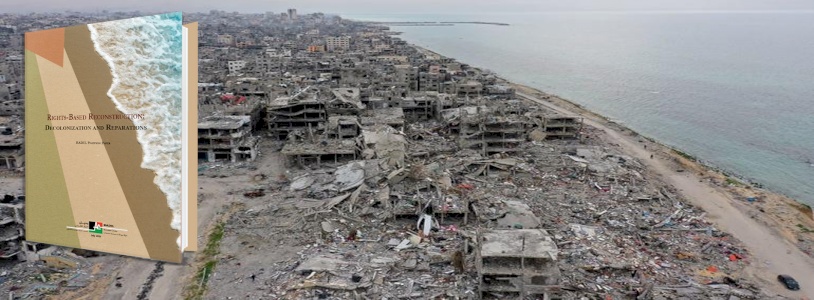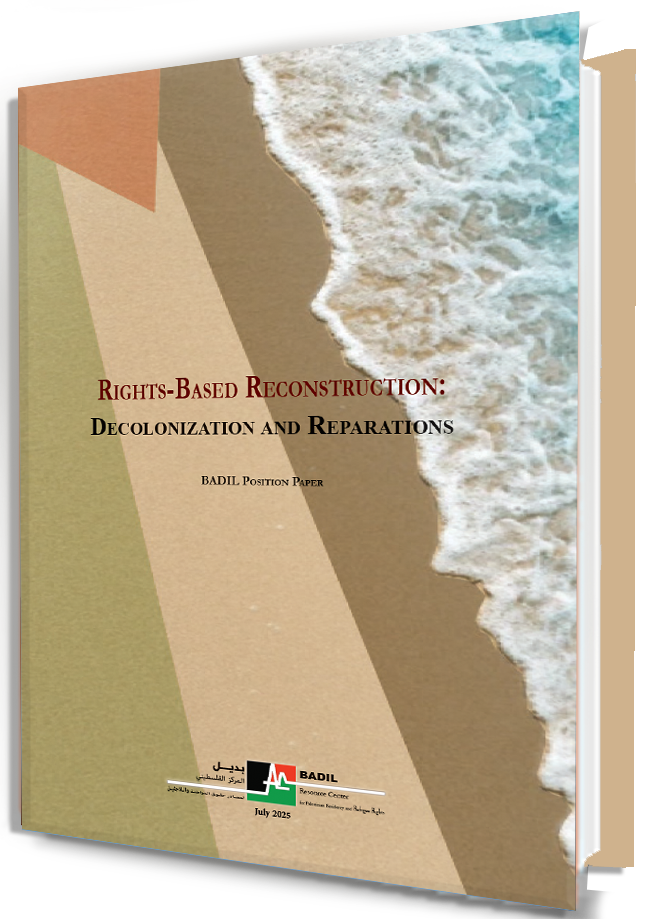Press Releases

Bethlehem, 8 July 2025
As the international community debates the future of Gaza amid catastrophic destruction from the Israeli regime’s 21-month genocide, BADIL Resource Center for Palestinian Residency and Refugee Rights issues a decisive call: reconstruction alone is not justice. BADIL emphasizes that the true path forward must be rooted in reparative justice—not donor-driven charity or foreign colonialism disguised as ‘recovery.’ In a newly released position paper titled “Rights-Based Reconstruction: Decolonization and Reparations,” BADIL critiques existing reconstruction proposals and urges a paradigm shift grounded in international law, accountability, and the inalienable rights of the Palestinian people.
 The paper begins with clarifying the distinction between “reconstruction” and “reparations” and their indivisibility to address the Israeli genocide in the Gaza Strip and 77 years of ongoing Nakba. It also addresses the gaps and flaws within the existing proposed plans and describes what a reparative approach must look like in the case of the Gaza Strip.
The paper begins with clarifying the distinction between “reconstruction” and “reparations” and their indivisibility to address the Israeli genocide in the Gaza Strip and 77 years of ongoing Nakba. It also addresses the gaps and flaws within the existing proposed plans and describes what a reparative approach must look like in the case of the Gaza Strip.
Reconstruction Is Not a Substitute for Reparations
While the physical rebuilding of Gaza is urgently needed—92% of homes destroyed, 1.9 million people displaced, and nearly 90% of schools unusable—BADIL underscores that this reconstruction must occur within a comprehensive reparations framework. This reconstruction, however, must be embedded within a comprehensive reparations framework that includes restitution—the return of refugees to their homes and lands in the Gaza Strip—alongside compensation for material losses and moral harm, rehabilitation through medical, psychological, and legal support, and satisfaction through truth-seeking processes, accountability, and guarantees of non-repetition.
These components must be situated within a broader rights-based vision for justice through reparations that centers the Palestinian people’s right to self-determination, and the full decolonization of Mandatory Palestine. It must also guarantee the right of return for the 9.76 million displaced Palestinians, uphold restitution and compensation for all those dispossessed. Finally, it must address both legal and financial accountability for the perpetrators and complicit allies: through the prosecution of the Israeli regime, individual perpetrators, and complicit actors for crimes, including genocide; and ensure that the burden of reconstruction and redress are born by the Israeli regime and its international allies, not on the victims of these crimes.
The paper asserts that both U.S. and Arab League plans treat Palestinians as passive recipients of aid rather than as rights-holders entitled to return, restitution, and self-determination. Trump’s plan is dismissed as a blueprint for genocide, openly proposing to bar Palestinians from returning and making volatile statements with no concrete solutions. Meanwhile, the Arab League plan—though more humane in tone—fails to address the root causes of Palestinian dispossession: colonization, apartheid, and forced displacement. Both reconstruction proposals are rooted in the Oslo-era status quo, sideline the rights of Palestinian refugees, reduce justice to a “two-state solution” talking point, maintain Israeli regime impunity and omit the word “reparations.”
Framing “reconstruction” as a substitute for reparations reveals a vision of Gaza’s future shaped not by the aspirations of its people and the principles of international law, but by the colonial geopolitical interests of regional and international powers. Furthermore, this form of ‘charitable’ reconstruction, as repeatedly proposed by the international community, compounds the Israeli regime’s impunity.
